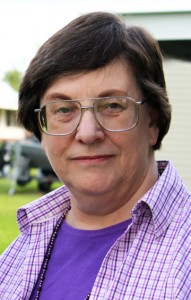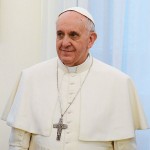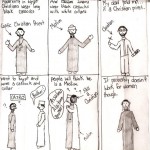
Today, to mark the opening of the Papal Conclave, we have a guest post from Donna Doucette, Executive Director of Voice of the Faithful, one of the nation’s major progressive Roman Catholic organizations, based in the Boston area. I asked Doucette to write about her group’s hopes for the future of the church. This editorial comes on the heels of my talk with Pulitzer Prize-winning Roman Catholic historian Garry Wills, who has called for the abolition of the papacy. Wills bases his argument within Roman Catholic thinking and theological analytic traditions; he’s not, at least, a self-identified Protestant. In our interview, Wills tackled the question of whether secrecy is built into the church’s ecclesiastical structure, and how it may allow the cover-up of various professional improprieties — the most serious being, perhaps, sexual misconduct and abuse of minors.
…for the protective instincts, of defer and distract — all of those machineries are in motion, and it’s very hard to break them. One of the aspects of the molestation scandal in Boston, where it became most salient f0r a while, was when the people in the parishes found out that hush money was being paid to the victims. And of course, that’s money they had donated. There was a great reaction against the Voice of the Faithful, which is what that movement was called. Some bishops forbid the formation of chapters in their dioceses.
Yesterday, we published a conservative Catholic response to Wills: a conversation with Tom Piatak, an editor at Chronicles magazine. Piatak himself said that he and every Roman Catholic should be distressed by sex abuse scandals, but also that people need to take some things into consideration when deciding “how much outrage should be directed at the church.”
Institutions generally act in a defensive way; it’s hardly limited to the Catholic Church. Jerry Sandusky at Penn State or Jimmy Savile and the BBC: things aren’t much different there, and they don’t see themselves as having divine authority…. the church has also taken a lot of steps in America to protect children. It does appear that this abominable behavior was relatively prevalent in the 70s and mid-80s, and since that time has subsided considerably. And other things were going on at that time, and one of them was the sexual revolution, which is one of the factors might be involved in the spiking of this behavior in the 70s and 80s, and of which Wills is a champion…. I doubt that the Catholic Church is less transparent than universities or a media institution like the BBC.
Here, then, is Voice of the Faithful’s response:
♔ ♔ ♔ ♔ ♔
Voice of the Faithful: Opinion for Patheos.com “Stories Untold”
![votflogo [Converted]](https://wp-media.patheos.com/blogs/sites/336/2013/03/votflogokeepfaithspot-300x147.jpg) Clericalism and its companion sins, insularity and arrogance, have long plagued the Catholic Church. Its most grievous manifestation in our time is the clergy sex abuse scandal and its decades-long cover-up by bishops, chancery officials, and the Vatican. To that toll can be added financial malfeasance, insistence on the second-class status of women in the Church, attempted silencing of legitimate theological expressions, indifference to the rights of lay people, and more.
Clericalism and its companion sins, insularity and arrogance, have long plagued the Catholic Church. Its most grievous manifestation in our time is the clergy sex abuse scandal and its decades-long cover-up by bishops, chancery officials, and the Vatican. To that toll can be added financial malfeasance, insistence on the second-class status of women in the Church, attempted silencing of legitimate theological expressions, indifference to the rights of lay people, and more.
We, the ordinary men and women who comprise almost the entire “body” of the Church, are not blameless in the clericalism that ascribes special status to men who become priests. We excuse the parish priest who refuses to provide a budget or allow independent audits that would show us where our money goes. We report suspected crimes to a Church official instead of the police. We reverence men who don gilded dress as they meet in secret to choose a new leader for millions of lay Catholics around the world—with no lay input and even less accountability.
Like Garry Wills, we see the clerical culture itself as the major component in these ills. Oaths of obedience, seminary training bereft of meaningful input from “outside” teachers and influences, demands for celibacy that even the Apostles were not expected to practice—all contribute to the mindset that clerics are “above” the laity and possess special powers deserving of privileged status.
For 10 years, Voice of the Faithful has confronted this mindset. We call for transparency and accountability, a call the hierarchy itself now echoes as a goal although they consistently fail to practice either. We seek justice for survivors—a goal more often obtained through court proceedings than by a bishop’s aid. We honor the priests, and an occasional bishop, who step beyond the clerical culture to serve as true ministers to the people of their parishes, to the poor and the suffering, to the victims of abuse, to the women denied full participation. We outline structural administrative changes that could throw open the doors Blessed Pope John XXIII tried to move when convening the Second Vatican Council. We have developed—and are practicing—methods that permit every lay person (and cleric) in a diocese to provide direct input into selection of the next bishop appointed there.
Does the hierarchy hear us? Well, they are unlikely to admit it. That, too, is characteristic of the clericalism that so hobbles our Church. One could assume, when the label “heretic” is so quickly pinned on anyone who questions the bishops or the Vatican, that they not only hear our voices but also perceive lay voices as a threat to their monarchical hierarchy. One could assume, from the lip service paid to terms like transparency, accountability, and justice that they at least hear the vocabulary even though it may take years to comprehend its demands.
And one also could assume that every priest and prelate ordained into the clerical caste exhibits the same failing. But we know they do not. There are numerous priests toiling along with everyday Catholics for a change in the clerical culture that so dominates our Church. They do so at great risk to their pensions, their health care, their livelihoods.
It can be a lonely struggle. We often hear that most Catholics simply don’t care about reform—the hierarchy is too powerful; the people too compliant; the isolation too enforced; the institution too large. But we know from the steady growth of Voice of the Faithful, and of other Church reform groups committed to addressing the problems, that more and more Catholics see the need to speak up, to lend their voices to the Church that ultimately IS us, all of us, spiritual companions along the path Jesus taught us.
Mr. Wills sounds a bit weary of this battle. We often share that weariness. Reform is hard work. It’s difficult and lengthy work. It requires collaboration and collegiality—ways of working together that, especially here in the U.S., do not come easily to many of us.
We persist because we must. If we care about our Church, and we do, we have no choice but to seek improvements.
We take heart, always, in the knowledge that Jesus did not don red shoes and gold cloaks or carry jeweled staffs, but His message endures. He had no checklist for entry into discipleship; He welcomed all. He cast out no one but those who would seek profit and power over the faithful.
Jesus was Rabbi/Teacher, not a Levite/priest of the Jews. When we raise our voices as “lay” people within the Roman Catholic Church, we are truly following the path set out for us by Jesus, who was Himself a layman—not a pope, bishop or priest.
A layman from Galilee.
Donna B. Doucette
Executive Director
Voice of the Faithful, Inc.
♔ ♔ ♔ ♔ ♔
What’s striking about Piatak’s and Voice of the Faithful‘s response is not so much that they are opposed — for people will always disagree — but that these people still take the same communion together. In the 21st century, it’s very rare to see true schism within Catholicism. This is unlike, say, what occurs among American Anglicans; Roman Catholic dissident voices rarely face lawsuits over real estate. That’s not to say that people don’t leave the Roman Catholic Church because they can no longer support its doctrine, dogma, or culture. But it is to say that the Roman Catholics who stay seem, on the whole, to find a general unity despite a very broad range of opinions on questions that touch right on the soul of their church. So, dear readers, two questions for you, one, perhaps, pessimistic, and the other optimistic:
- How do Roman Catholics advance their dialogue so that they no longer have what seems to be a perennial, irresolvable dispute that falls along a conservative-progressive spectrum, similar in form to American politics? That is, is there a “third way” — a way of stepping above this spectrum and finding a new, more universally-acceptable framework for understanding problems like clergy misconduct cover-ups or the dispute over the sexuality/gender issues like abortion, contraception, and whether women should be priests?
- What is it about Roman Catholicism that holds it together despite all this?












